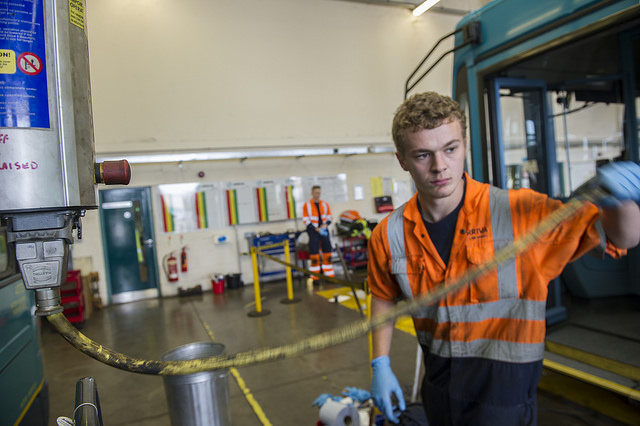
Due to a range of cultural pressures and government incentives, the four-year college degree has become somewhat of a rite of passage in economic life. From the prompts of parents and teachers to the prods of student-loan subsidies, we are routinely encouraged to double down on a cookie-cutter approach to higher education.
Yet as college tuition continues to rise — outpacing general inflation by a wide margin — and as students find themselves increasingly skeptical of the promise of such a path, one can’t help but wonder if an educational renaissance is in order.
The concerns are beginning to resonate, and we’re seeing responses not only in churches and community and cultural institutions, but also in the halls of political power and policymaking. In Colorado, for example, a new program seeks to challenge the status quo, connecting students more closely with business and hands-on work, and expanding their vocational horizons, in turn.
It began with business owner Noel Ginsburg, CEO of Intertech Plastics, who recognized the need for a shift in the public imagination. Facing a drastic labor shortage in his own business, and noticing a significant skills gap in tech jobs across Colorado, Ginsburg saw an opportunity to train, empower, and educate a new generation of workers.
“I was part of that mantra, saying everybody should go to college. The reality of it is, that’s never going to happen,” says Ginsburg in a recent profile from PBS. ”…So, we’re essentially telling everybody else that they can’t be successful in our economy and in our country. And it’s simply not true.”
In response, Ginsburg partnered with the State of Colorado and high schools throughout the area to found CareerWise, “an apprenticeship program that links Colorado industries and school districts.”
Through the program, students earn wages and split their time between learning in the formal classroom and on the job, yielding approximately a years worth of debt-free college credit. Although the program is technically “pre-college,” that’s also the point: to help shape the mindsets and imaginations of students as they consider their economic contributions and educational options, stretching their perspective beyond the typical trajectory.
According to Uzi Levine, Former U.S. Ambassador to Switzerland, the model is exactly what America needs to return to its economic roots. “We’re at the front end of an apprenticeship renaissance in the United States,” she says. “When you look back at Hamilton and Franklin, [they] started out as apprentices. In Switzerland, two-thirds of young people go into apprenticeship. Their youth unemployment is just 3.2 percent. We need that here in the United States.”
But the program doesn’t just change students’ perspectives on their careers or improve their employment prospects, it also affirms the value of the workplace in developing character and critical thinking. As Ginsburg explains, business is often a better training ground than the formal classroom for such lessons, involving a unique mix of hands-on challenges, real relationships, and practical analysis. “Those skills can be learned in the workplace, because the workplace is real, and you have different personalities,” he says. “I think soft skills are better taught in business, not in the classroom.”
These programs are experimental, and there’s plenty to be explored and questioned in terms of how they’re funded and whether they’re sustainable. According to PBS, the plan is to have funding secured primarily via private industry. But regardless, such steps present refreshing challenges to the status quo of policy and cultural assumptions.
Rather than approaching students as products on a rotating college assembly line, what if we regarded each individual as a creative person with unique gifts, educational goals, and vocational aspirations? Rather than approaching the “job market” as a dumping ground for “accredited” students, what if we saw it as an ecosystem of creativity and collaboration, filled with human needs waiting to be met, regardless of training and education required?
We have plenty of work to do in addressing the skills gap, whether via policy, entrepreneurship, or a deeper social and spiritual shift in our attitudes and expectations when it comes to work, wisdom, and vocation. But opening up these sorts of opportunities is a promising place to begin.

